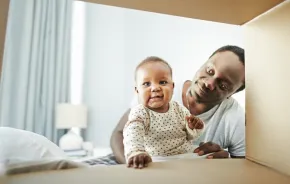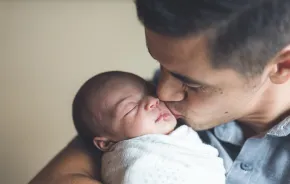"I looked down at my tiny baby and I loved him, but... I was filled with such sadness because my relationship with my firstborn child would never be the same. I felt like putting the baby in a safe place and grabbing my 3-year-old and strapping him into his car seat and just driving away. I mean... I knew we were giving him the greatest gift by having this baby brother, but... it broke my heart that it would never be just the two of us, ever again." So one Seattle mother remembers the grateful but confusing days that followed the birth of her second son.
Few mothers -- confident veterans who can change the diaper of a toddler in motion and recite Goodnight Moon from memory -- anticipate the bittersweet feelings of loss sometimes evoked by the birth of their second child. The birth of a second child causes the family's internal structure to shift. Mothers can feel torn between the needs of both children and even mourn the loss of exclusivity in their relationship with their firstborn child.
Deborah Wooley, psychotherapist and a parent educator in the North Seattle Community College Co-Op Preschool system, says that while such feelings are "common and normal," they often "catch women by surprise." Wooley thinks feelings of grief are part of a larger developmental process within the mother herself: "The birth of a second child helps you find a sense of yourself as a parent, separate from the child."
Second-time moms, she says, can feel trapped in a cycle: resentment of the second child for intruding on her time with the first child, plus shame at those feelings coupled with resentment of the firstborn for preventing mom from experiencing the same intense just-you-and-me feeling with the second child that she felt with the first. When women are able to talk about these feelings with others who've been through it, they can move into acceptance of the change within their relationship and begin to feel the joy of the developing sibling relationship.
Seattle marriage and family therapist Melissa Gayle West agrees. Maternal grief, she says, gets named in other ways, such as exhaustion or anger. Moms silence themselves about grief feelings because "in our culture, the mother is always the smoking gun. Mothers know this and don't talk -- they shut themselves down."
West describes the birth of a second child as "Mom meeting her own shadow -- you think you've processed your own issues through, based on what the first child brought up, then the second child brings up other issues."
For fathers, though, the birth of a second child can offer the chance to forge a deeper connection with their firstborns. When a new sibling broadens the mother-firstborn circle, many dads welcome the chance to step in. According to Bernie Dorsey, founder of the Seattle-based new-father education group Conscious Fathering, "Dads can bridge the gap and have a chance to fulfill a definition of fatherhood that is different from what they may have been offered with the first baby."
And what about the firstborn, suddenly forced to share mommy and daddy? Parenting expert and Seattle Times columnist Jan Faull, M.Ed., says that many toddlers feel "baffled, not jealous" at the changes a sibling brings. Faull says parents can help children by acknowledging the difficulty and sadness inherent in the process, validating the older child's feelings, and giving the situation time.
"Stay home, play in the living room, take care of 'us' -- just do the best you can," Faull says. Quickly meeting the older child's needs (for example, getting juice when asked rather than after infant care or sitting down to read for even a few minutes) will calm worried toddlers. Faull also points out that second-time parents should ask for help, professional or otherwise. "Churches, friends, family -- there is help out there for people, but you usually have to ask," she says.
The birth of a new baby is right near the top of those lists of major life stresses. A new family unit, too, is being born. Welcoming an infant means that family members of all ages must shift a little to make room. And that shifting, while sometimes painful, eventually transforms parents and children into a newly bonded deeply rooted family.
Paula Becker is a Seattle-based writer and mother of three.
Experts' advice for moms:
- Approach other moms with two-plus kids.
- Find a safety net of supporting listeners who don't pathologize your grief.
- Create a grief ritual (if that feels helpful) naming and releasing the old family and acknowledging that you will never go back to what you were.
- Know that grief feelings are normal and common. Don't let shame silence you.
Local resources for second-time parents:
- PEPS (Program for Early Childhood Support) offers free Infant/Toddler (up to age 3) groups throughout Seattle and Bellevue. Many second-time parents participate. www.pepsgroup.org/
- Conscious Fathering offers classes in hospitals throughout the region.
- All Seattle-area community colleges offer parent education programs, including access to parent educators. North Seattle Community College's website has links to other area programs: www.northonline.sccd.ctc.edu/parented/index.html









